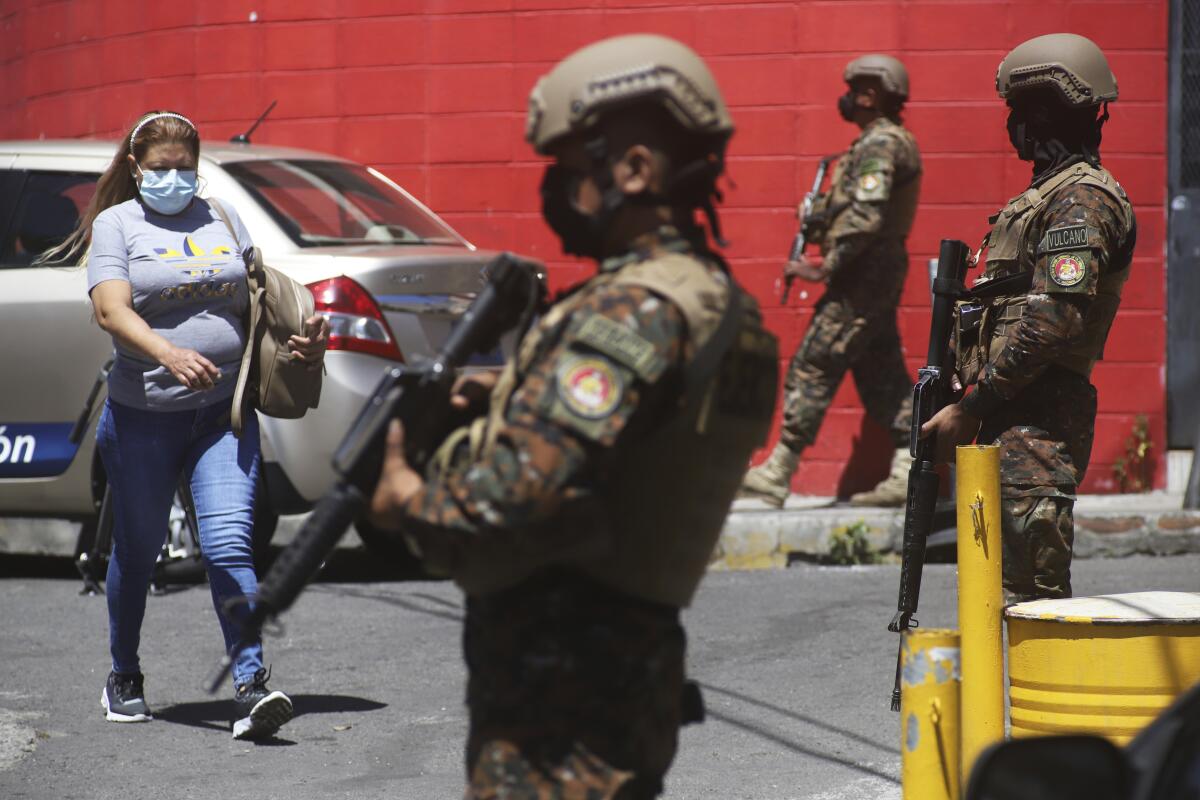El Salvador forces encircle neighborhoods in gang crackdown

- Share via
SAN SALVADOR, El Salvador — Security forces intensified operations against El Salvador’s street gangs Tuesday with mass arrests, the cordoning off of neighborhoods and house-by-house searches under a state of emergency sought by President Nayib Bukele.
The country’s relatively low homicide rate during Bukele’s administration had been one of his most touted accomplishments. Even while some raised doubts about how it was obtained, the country had been living in peace compared with earlier periods of bloodshed.
That changed last weekend when 89 people were killed in a four-day span, in contrast to 79 in all of February. The Congress passed Bukele’s state of emergency early Sunday giving authorities broad latitude in making arrests and extending jail time while investigations are carried out.
Atty. Gen. Rodolfo Delgado told state television that in the last two days nearly 1,500 alleged gang members were captured “without firing a single shot.”
Only two murders were confirmed Monday compared with 62 on Saturday.
“I’ve been a victim of the gangs, I’ve paid them” extortion, said Esteban Maravilla, who works in transportation. “They should lock them all up.”
Bukele enjoys extremely high popularity in El Salvador, but some heavy handed and even authoritarian tactics have drawn criticism.
Opposition politicians and nongovernmental organizations say security forces are going beyond even their newly enhanced powers.
Eduardo Escobar, director of the nongovernmental Citizen Action organization, noted that the state of emergency had not included restrictions on mobility, yet security forces had encircled some neighborhoods, controlling who entered and who left.
At an entrance to the San Jose El Pino neighborhood in Santa Tecla near the capital Tuesday, soldiers wearing masks and carrying rifles stopped everyone entering and leaving, searched cars and backpacks and required identification documents. They denied access to an Associated Press reporter.
“I have my employment card and my [identification] and I haven’t had problems, but they search everything, everything,” said Héctor Flores near a military barricade. “The soldiers and police entered Sunday night and went house to house. I believe they took them [gang members] all, but they are still looking.”
National lawmaker Claudia Ortiz of the conservative Vamos party, said, “Free transit was not limited [in the state of emergency], and there are already citizens denouncing the encircling of neighborhoods.”
William Soriano, a lawmaker from Bukele’s New Ideas party, suggested the surge in homicides could have been a message from the gangs after the government took control of two bus routes in the capital earlier this month. The gangs extort from transportation companies and drivers, and the government takeover of nearly 300 vehicles slashed a revenue stream.
“Coincidentally after they intervene in certain public transportation routes which function as a way to launder money for the gangs, as a source of income for the gangs ... this spike occurs,” Soriano said. “It means they’re directly touching the gangs’ pockets.”
The state of emergency could last 30 days and possibly be extended.
Bukele has railed against politicians from previous administrations who allegedly entered into pacts with the street gangs to lower killings in exchange for benefits for their imprisoned leaders. The president has vehemently denied that his administration had entered into a similar deal.
He has been accused of infringing on fundamental rights before. Early in the pandemic, Bukele’s administration was criticized for holding people caught breaking curfew or who returned to the country from abroad in detention centers as a way to try to limit the spread of COVID-19.
More to Read
Sign up for Essential California
The most important California stories and recommendations in your inbox every morning.
You may occasionally receive promotional content from the Los Angeles Times.









